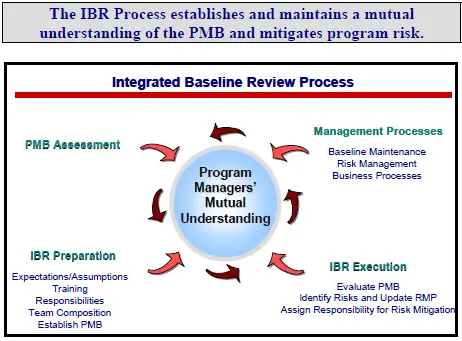An Integrated Baseline Review (IBR) (FAR 34.202)is a joint assessment conducted by the government Program Manager (PM) and the contractor to establish a mutual understanding of the Performance Measurement Baseline (PMB). This understanding provides for an agreement on a plan of action to evaluate the risks inherent in the PMB and the management processes that operate during program execution. The integrity of the project’s technical, schedule, and cost baselines is the IBR’s main concern. It should show that a project plan can be carried out and that project risks and opportunities have been recognized and assessed.
Definition: A Integrated Baseline Review (IBR) is an assessment between the government and a contractor to confirm that a project is properly planned, can be executed, and a Performance Measurement Baseline is established.
Integrated Baseline Review (IBR) Requirement
On government contracts, Program Managers are required to conduct IBR’s on all cost or incentive contracts that require the implementation of Earned Value Management (EVM) (contracts valued at or greater than $20 million). Must be conducted within 180 days of project start.
Integrated Baseline Review (IBR) References
Guide: Program Managers Guide to the Integrated Baseline Review (IBR)
Website: FAR 34.202 “Integrated Baseline Review”
Purpose of an Integrated Baseline Review (IBR)
The purpose of the IBR is to verify the technical content and the realism of the related performance budgets, resources, and schedules. It should provide a mutual understanding of the inherent risks in offerors’/ contractors’ performance plans and the underlying management control systems, and it should formulate a plan to handle these risks. An IBR should be used to understand:
- The scope of the PMB is consistent with authorizing documents;
- All activities and deliverables required by the Statement of Work (SOW) are in the Work Breakdown Structure (WBS);
- Work packages are developed at the appropriate level of the WBS;
- Management control processes;
- Risks in the PMB associated with cost, schedules, and resources; and
- Corrective actions where necessary.
Integrated Baseline Review (IBR) Results
Completion of the review should result in the assessment of risk within the PMB and the degree to which the following have been established:
- The technical scope of work is fully included and is consistent with authorizing documents,
- Key project schedule milestones are identified and supporting schedules reflect a logical flow to accomplish the work,
- Resources (budgets, facilities, infrastructure, personnel, skills, etc.) are available and are adequate for the assigned tasks,
- Tasks are planned and can be measured objectively relative to the technical progress,
- Rationales underlying the PMB are reasonable, and
- Management processes support the successful execution of the project.
When to conduct an Integrated Baseline Review (IBR)
IBRs should be scheduled as early as practicable and the timing of the IBRs should take into consideration the contract period of performance. The process will be conducted not later than 180 calendar days (6 months) after:
- Contract award,
- Exercise of significant contract options, and
- Incorporation of major modifications.
IBRs are also performed at the discretion of the PM or within a reasonable time after the occurrence of major events in the life of a program. These events may be the completion of the Preliminary Design Review (PDR), completion of the Critical Design Review (CDR), a significant shift in the content and/or time phasing of the PMB, or when a major milestone such as the start of the production option of a development contract is reached. Continuous assessment of the PMB will identify when a new IBR should be conducted.
AcqTips:
- The PMB should be placed under Configuration Control with changes only upon mutual agreement of the government and contractor.
- See Control Account
AcqLinks and References:
- DoD IBR Checklist – 28 Sep 2009
- AF Integrated Baseline Review (IBR) Process Guide – Sep 2012
- Website: FAR 34.202 Integrated Baseline Review
- Guide: Program Managers Guide to the IBR
- Presentation: IBR Defense Acquisition University Presentation
- Presentation: IBR Presentation by Earned Value Associates LLC
Updated: 6/26/2021
Rank: G2

